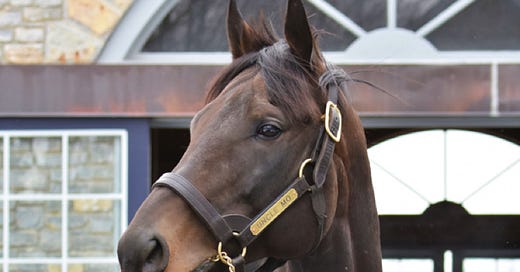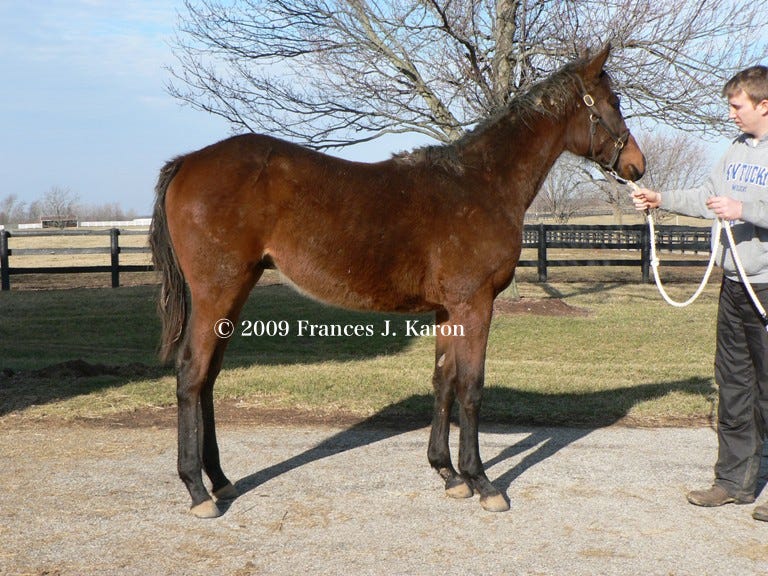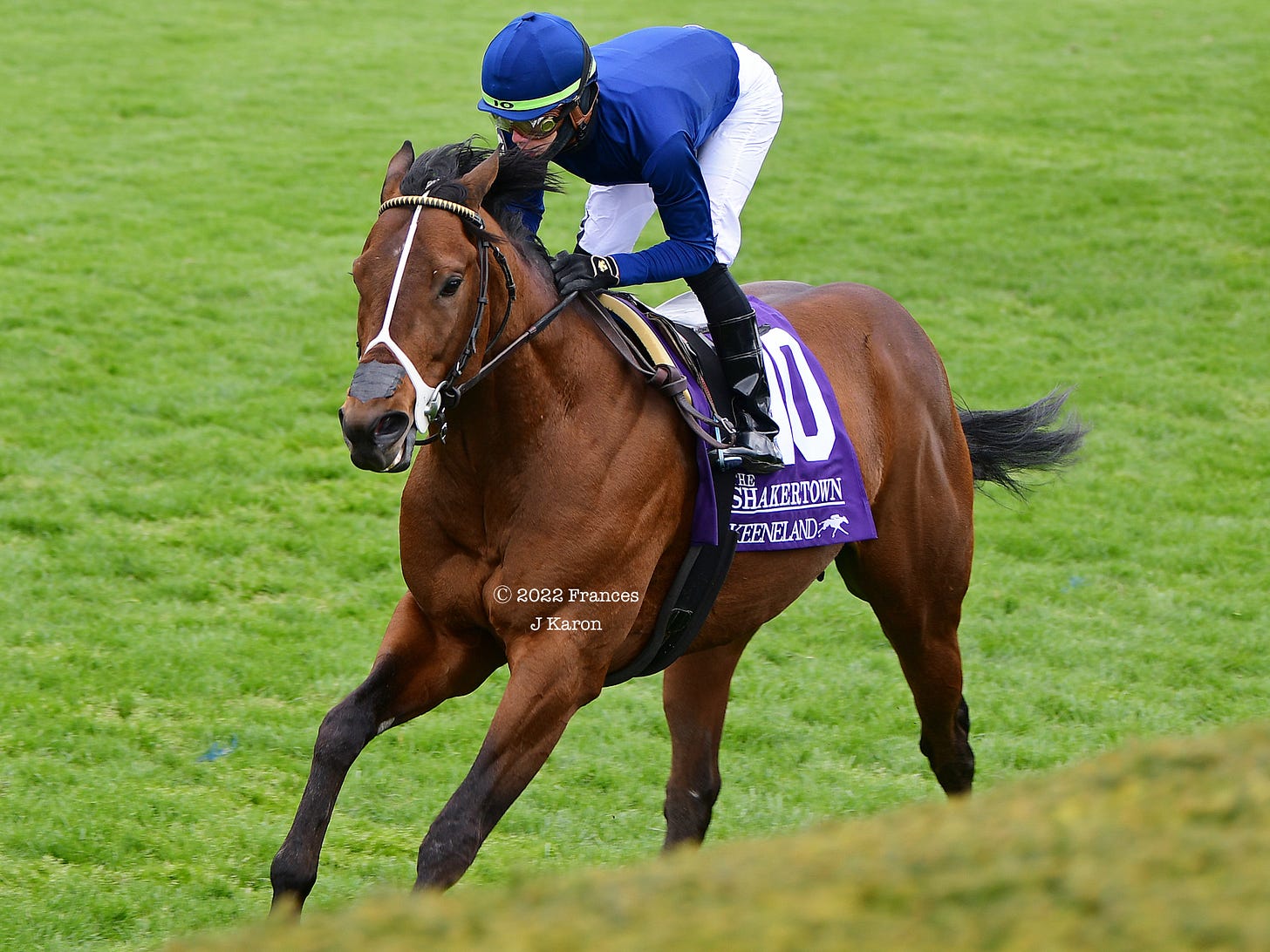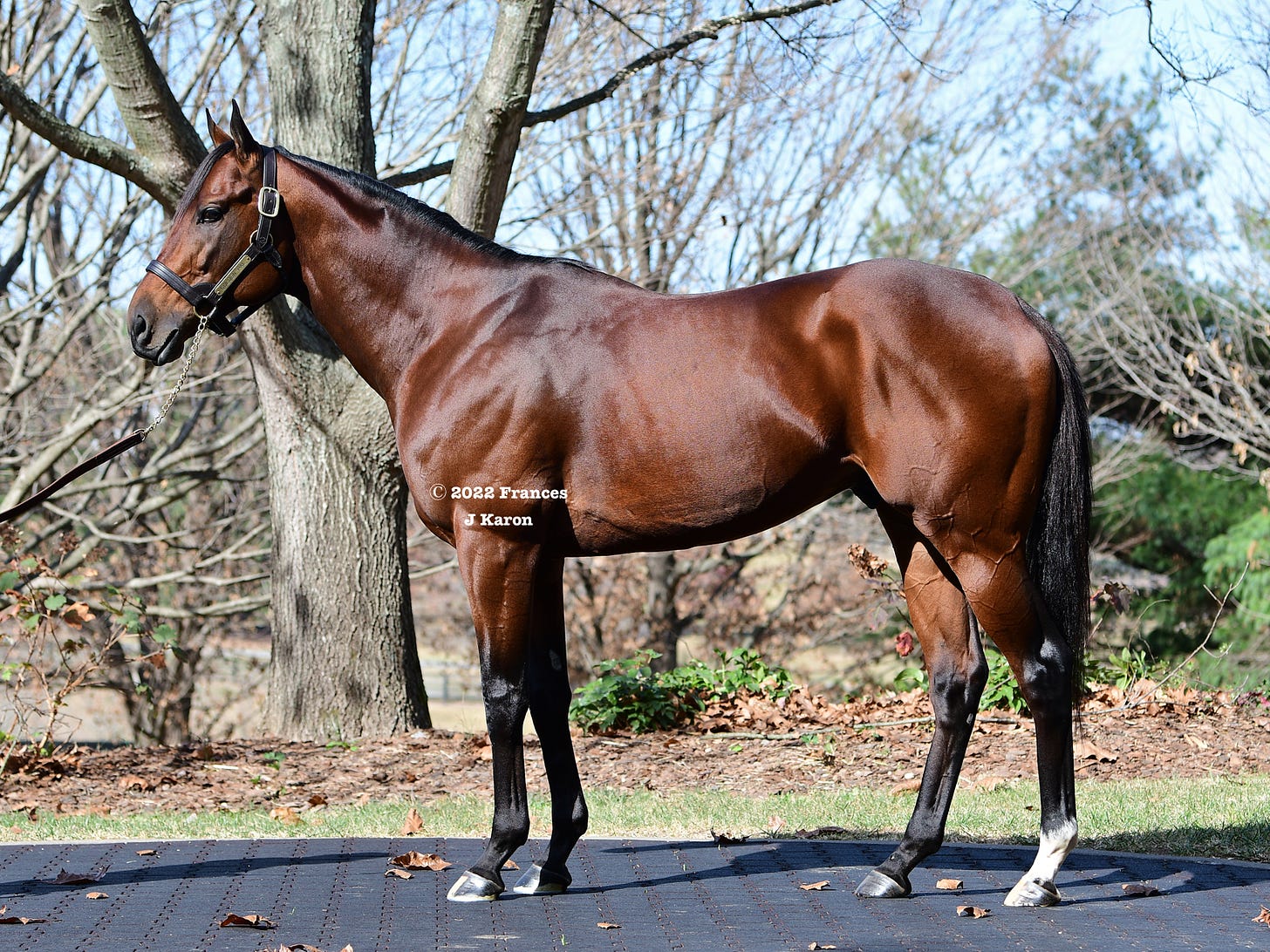By Frances J. Karon
Coolmore America’s 16-year-old stallion Uncle Mo was represented by his 100th stakes winner on Sunday when Live Oak homebred Crystal Quest—his sire’s fourth stakes winner from a Giant’s Causeway mare—won the Equistaff Sophomore Turf S. at Tampa Bay Downs for trainer Michael Trombetta.
Uncle Mo is the youngest of the nine active N. American stallions to achieve the 100 stakes winners milestone, and he’s at the forefront as he continues to build on the Caro male-line resurgence begun by his grandsire In Excess (sire of 57 stakes winners) and expanded by sire Indian Charlie (83 stakes winners). Uncle Mo’s great-grandsire, Siberian Express, sired just 10 stakes winners from 323 foals and was one of the less successful stallion sons of Caro, who himself was the sire of 77 stakes winners, or 12% stakes winners to foals.
Caro—Uncle Mo’s great-great-grandsire—was a champion in France as well as a top sire in the 1970s and 1980s. He was leading sire in France in 1977 and moved to Spendthrift Farm in the U.S. for the 1978 breeding season. Among his notables in N. America were Canadian Triple Crown winner With Approval; Kentucky Derby-winning filly Winning Colors; Breeders’ Cup Mile winner Cozzene—the sire of Breeders’ Cup Classic winner Alphabet Soup as well as Mizzen Mast, who sired Breeders’ Cup-winning fillies Mizdirection (twice), Caravel, and Flotilla; and Dr. Carter, who like Cozzene stood at Gainesway. All their successes notwithstanding, if not for the Siberian Express/In Excess/Indian Charlie/Uncle Mo branch, Caro’s male line in the Northern Hemisphere would be irrelevant right now. (You can read Sid Fernando on “Sire line detours” here.)
Spendthrift-bred great-grandsire Siberian Express won the Group 1 Prix Morny at two and the Classic Poule d’Essai des Poulains at three, but he was not a wildly successful stallion. Outside of In Excess, his best runner was Grade 1 winner Siberian Summer, the sire in turn of the Grade 1 winner and excellent broodmare Dream of Summer.
In Excess, Uncle Mo’s grandsire, was foaled in Ireland and won of three-of-six starts at two and early in his 3-year-old season for owner/breeder Ahmed Foustok—who died last month—and trainer Bill O’Gorman in England before being sold to Jack Munari and trainer Bruce Jackson in the U.S., where he was a Grade 3-winning sophomore on the turf in California. At four on the dirt, he won four consecutive Grade 1 handicaps in New York: the Metropolitan, Suburban, Whitney, and Woodward. He tailed off at five, with no wins from five starts. Despite In Excess being such a talented and versatile racehorse, as a son of an unremarkable sire who was a forgotten horse by the time connections were looking for a stud deal, John T.L. Jones Jr.’s attempt to market him to Kentucky breeders at Walmac Int’l wasn’t fruitful. In Excess instead retired to stud at Vessels Stallion Station in California.
From there, In Excess, importantly, sired Indian Charlie, plus French Classic winner Musical Chimes and Grade 1 winner Romance is Diane. He also got Grade 2 winner Notional, who sired seven stakes winners—one graded—from 405 foals. In Excess is the broodmare sire of Kentucky Derby winner Always Dreaming (Bodemeister).
Indian Charlie raced as a homebred for Hal Earnhardt III. The Bob Baffert-trainee won four of his five starts, led by the G1 Santa Anita Derby, and his only loss was a third as favorite in the 1998 Kentucky Derby, his last start. Retired to Vinery for the 1999 breeding season and later moved to Airdrie—where Uncle Mo was conceived—Indian Charlie was a $10,000 stallion for his first five years. By the time of his death in December of 2011, he’d worked his way up to a $70,000 stud fee. Other than Uncle Mo, his best were U.S. champions Indian Blessing and Fleet Indian, and Canadian champions Roxy Gap and Indian Apple Is. He’s the broodmare sire of Horse of the Year Flightline (Tapit), whose first foals are arriving this year; and champion sprinter and leading freshman sire of 2023, Mitole (Eskendereya).
Although Indian Charlie left us with sons Adios Charlie (a more than useful stallion currently in Florida, and sire of three graded winners, including Grade 1 winner Patternrecognition, who’s a stallion in Chile); and Bwana Charlie (now dead), Conveyance (active in Washington as recently as 2023), Indian Evening (dead), and Souper Speedy (standing in Canada)—each of whom is the sire of one graded winner—the line is flourishing solely to Uncle Mo and his young sons.
Uncle Mo won the G1 Champagne and Breeders’ Cup Juvenile on his way to the 2-year-old championship at the end of an undefeated campaign. His 3-year-old season was interrupted by stomach issues that necessitated his scratch from the Kentucky Derby two days before the race, but he made five starts that year, winning twice—topped by the G2 Kelso—and was off the board only once in his career, in the 10-fur. Breeders’ Cup Classic, after which he was retired. He won from six furlongs to 1 1/16 miles.
UNCLE MO (2008 Indian Charlie – Playa Maya, by Arch)
B: D. Michael Cavey DVM
O: Repole Stable
T: Todd Pletcher
Record: 8-5-1-1, $1,606,000
Highest achievement: Champion 2-year-old and Breeders’ Cup Juvenile winner
Most recent auction price: $220,000 at Keeneland September
The Breeders’ Cup Classic loss, plus his third-place finish in the 9 fur. Wood Memorial, led some to question his stamina when he went to stud. However, his results have laid those questions to rest; Uncle Mo has sired two U.S. Classic winners, with Grade 1 winners from five to 12 furlongs. He gets class on dirt and turf. Among his standouts are Kentucky Derby winner Nyquist, a champion 2-year-old and sire already of U.S. champion Vequist and Grade 1-winning Canadian champion Gretzky the Great (we wrote about Nyquist here); Belmont winner Mo Donegal; and dual Breeders’ Cup-winning turf sprinter Golden Pal, who stands alongside his sire at Coolmore America for $25,000 this year.
As for the next generation, Uncle Mo already has four individual sons—Laoban, Mo Town, Nyquist, and Outwork—who have sired at least two or more Northern Hemisphere graded stakes winners each. Golden Pal and Mo Donegal’s first foals are arriving this year, and graded stakes-winning sons with first yearlings are Yaupon and Modernist in Kentucky, plus Grade 1 winner Mo Forza in California, where it all began for In Excess 30 years ago and where Indian Charlie was foaled. He has two stakes-winning New York-based sons—King for a Day and Name Changer—with first 2-year-olds, and, in Kentucky, there’s Grade 1-placed Caracaro, who was represented by a $220,000 colt at the OBS March sale of 2-year-olds bred off an advertised $6,500 stud fee.
Uncle Mo stands in 2024 for $150,000.








Frances----thanks for this refresher and perspective----while not on board early I am now!
One can only imagine how In Excess's future in KY as a stallion could have been affected had he been entered in that 1991 Breeders Cup Classic instead of the BC Mile.
In more contemporary Breeders Cups, decisions for dirt handicap standouts usually center around the Classic or Dirt Mile, as that is now an option. Recent Dirt Mile winners have earned their ticket to KY stud farms with decisive wins (Liam's Map, City of Light, Knicks Go, Life is Good, and Cody's Wish). But in 1991, this was not an option.
Let's face it: In Excess's victories in the Met Mile, Surburban (back then a G1), Woodward, and Whitney would lead any trainer to point to the Classic, until that infamous series of works over the Churchill Downs oval that did not find favor with Bruce Jackson. It was reasoned that his turf pedigree and previous turf form was good enough to make a season-ending run and claim for the HOTY title in the BC Mile.
The horse In Excess had demolished in the Met Mile, Black Tie Affair, wired that 1991 BC Classic field.
When Cozzene sired other handicap stars Running Stag and Alphabet Soup (BC Classic winner on WO dirt), one could only think of how unfair it was to pidgeonhole sons of Caro as sires of only top-level turf runners. At what point does one set aside pedigree and instead focus on what the athlete has accomplished on his own merits on a particular surface. In Excess showed us that it is very difficult to be dominant on G1s on dirt AND turf; one surface is usually preferred, regardless of pedigree.
Here was a good article on the subject with embedded youtube videos:
https://www.brisnet.com/content/2019/10/in-excess-a-cautionary-tale-of-making-the-right-breeders-cup-race-choice/